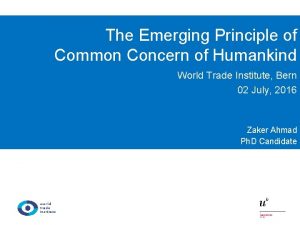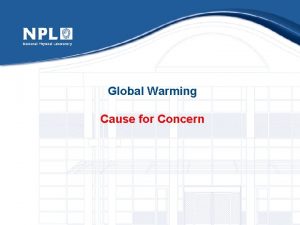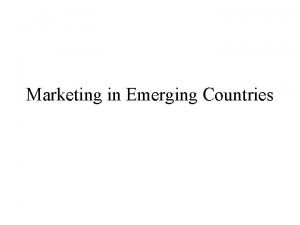The Emerging Principle of Common Concern of Humankind













- Slides: 13

The Emerging Principle of Common Concern of Humankind World Trade Institute, Bern 02 July, 2016 Zaker Ahmad Ph. D Candidate

The Problem of Managing Commons • Taking collective action to manage common interest is difficult both within and beyond States – Domestic examples • Common pasture • Sustainable management of a forest or a lake – International examples • Global human rights enforcement system • Combating anthropogenic climate change • Protection and preservation of biodiversity

The Problem of Managing Commons • Tragedy of the Commons (Hardin, 1968) Image source: http: //www. jborden. com/wp-content/uploads/2015/02/tragedy_commons. jpeg

The Problem of Managing Commons • Internationally, managing commons is especially problematic because of two interconnected reasons – Disconnect between international and domestic law – Notion of Permanent Sovereignty of States • Can international law allocate appropriate powers in appropriate levels of governance so as to efficiently tackle collective action problem?

Five Storey House Public international constitutional law (UN, WTO, VCLT and other fundamental rules) European constitutional law (EUT, TFEU) Federal constitution Constitution of sub-federal entities (Cantons) Constitution of Communes

Evolution of Common Concern • The idea has found expressions (in introductory parts) in different international agreements – – – 1992 - UNFCCC (Climate Change) 1992 - CBD (Biological Diversity) 2005 - International Health Regulations (WHO) 2001 - ITPGRFA (Plant Genetic Resources) 2003 - CSICH (Intangible Cultural Heritage) 2015 - Paris Agreement (Climate Change)

The Evolution of Common Concern Common Interest and Common Heritage 1992 Biological Diversity(CBD) 1992 Climate Change (UNFCCC) • • 2015 Climate Change (Paris Agreement) 2003 Intangible Cultural Heritage (CSICH) 2001 Plant Genetic Resources (ITPGRFA) 2005 International Health Regulations (WHO) Preamble, para 11 (also appears in the decision CP. 21) Acknowledging that climate change is a common concern of humankind, Parties should, when taking action to address climate change, respect, promote and consider their respective obligations on human rights, the right to health, the rights of indigenous peoples, local communities, migrants, children, persons with disabilities and people in vulnerable situations and the right to development, as well as gender equality, empowerment of women and intergenerational equity

Legal Issues • What is the normative value and content of “Common Concern of Humankind”? • Does it inform the interpretation of the respective agreement and of other, related agreements? • Does it has the potential to develop into a legal principle?

Hypothesis • Common Concern of Humankind should be understood as depicting problems relating to the production of Public Goods, which cannot be solved by a single State • Common concern thus has three dimensions:

Hypothesis Obligation to cooperate internationally (e. g. in the field of transfer of technology, monetary and financial regulations or humanitarian aid) Obligation to do homework in domestic law contributing to solutions of the problem (e. g. protecting human rights, promoting monetary stability, public trust doctrine) Right and obligation to take action in case of insufficient action by States abroad: deployment of extraterritorial effects (for example R 2 P, trade restrictions based upon PPMs)

Implications • A common framework to assess global shared problems (e. g. migration, climate change, humanitarian crisis) • Responding to shared problems is not a matter of right, but a matter of ‘obligation’ for the governments • Strengthening laws’ connection to core moral values • Civil society can play a role in building the critical mass

Migration as a Common Concern THANK YOU zaker. ahmad@wti. org

Literature • Thomas Cottier, Philipp Aerni, Barış Karapınar, Sofya Matteotti, Joëlle de Sépibus, Anirudh Shingal, ‘The Principle of Common Concern and Climate Change’, in: 52 Archiv des Völkerrechts 52, 293 -324 (2014) • Krista Nadakavukaren Schefer, Thomas Cottier, ‘The Responsibility to Protect (R 2 P) and the Emerging Principle of Common Concern’, in: Hilpold, Peter (ed. ). Responsibility to Protect (R 2 P). A New Paradigm of International Law? Leiden: Brill Nijhoff 2015, p. 123 -142. • Thomas Cottier, Sofya Matteotti-Berkutova, ‘International environmental law and the evolving concept of ‚common concern of mankind’’, in: Cottier, Thomas / Nartova, Olga / Bigdeli, Sadeq Z. (eds. ). International Trade Regulation and the Mitigation of Climate Change. Cambridge 2009, S. 2147). • Brown Bag Seminar, World Trade Institute, The Emerging Principle of Common Concern – Introducing the SNF Project, Feb. 2006, Podcast available at https: //cast. switch. ch/vod/clips/2 la 48 isrnk/streaming. html
 What do you mean by accounting convention
What do you mean by accounting convention Going on concern principle
Going on concern principle Going concern principle
Going concern principle Accounting period concept in accounting
Accounting period concept in accounting Language
Language Go go go said the bird humankind
Go go go said the bird humankind The way god communicates knowledge of himself to humankind
The way god communicates knowledge of himself to humankind Humankind leo burnett
Humankind leo burnett Humankind
Humankind Humankind stonehenge
Humankind stonehenge Did hephaestus obey zeus's order
Did hephaestus obey zeus's order What is the imaginary elixir of life
What is the imaginary elixir of life Thematic concern
Thematic concern Age concern gosport
Age concern gosport

























